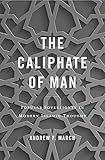The caliphate of man : popular sovereignty in modern Islamic thought / Andrew F. March.
Material type: TextPublication details: Cambridge The Belknap Press of Harvard University Press 2019Description: 300 pages ; 24 cmISBN:
TextPublication details: Cambridge The Belknap Press of Harvard University Press 2019Description: 300 pages ; 24 cmISBN: - 9780674987838
- BP 173.7 MAR 23
- BP173.7 MAR .M3769 2019
| Item type | Current library | Collection | Call number | Status | Notes | Date due | Barcode | Item holds | |
|---|---|---|---|---|---|---|---|---|---|
 Books
Books
|
JST Library General Stacks | BP<br>Islam. Bahaism. Theosophy, etc. | BP 173.7 MAR (Browse shelf(Opens below)) | Available | Donated by Fr. Daniel Madigan SJ, | 108887 |
Includes bibliographical references (pages [231]-281) and index.
Preface: "The people wills..." -- The idea of Islamic democracy -- The question of sovereignty in classical Islamic political thought -- The crisis of the caliphate and the end of classical Islamic political theory -- The sovereignty of God and the caliphate of man -- The law we would give ourselves -- The caliphate of man empowered -- After Islamic democracy, after sovereignty.
The Arab Spring precipitated a crisis in political Islam. In Egypt Islamists have been crushed. In Turkey they have descended into authoritarianism. In Tunisia they govern but without the label of "political Islam." Andrew March explores how, before this crisis, Islamists developed a unique theory of popular sovereignty, one that promised to determine the future of democracy in the Middle East. This began with the claim of divine sovereignty, the demand to restore the sharīʻa in modern societies. But prominent theorists of political Islam also advanced another principle, the Quranic notion that God's authority on earth rests not with sultans or with scholars' interpretation of written law but with the entirety of the Muslim people, the umma. Drawing on this argument, utopian theorists such as Abū'l-Aʻlā Mawdūdī and Sayyid Quṭb released into the intellectual bloodstream the doctrine of the caliphate of man: while God is sovereign, He has appointed the multitude of believers as His vicegerent. The Caliphate of Man argues that the doctrine of the universal human caliphate underpins a specific democratic theory, a kind of Islamic republic of virtue in which the people have authority over the government and religious leaders. But is this an ideal regime destined to survive only as theory?--
There are no comments on this title.

